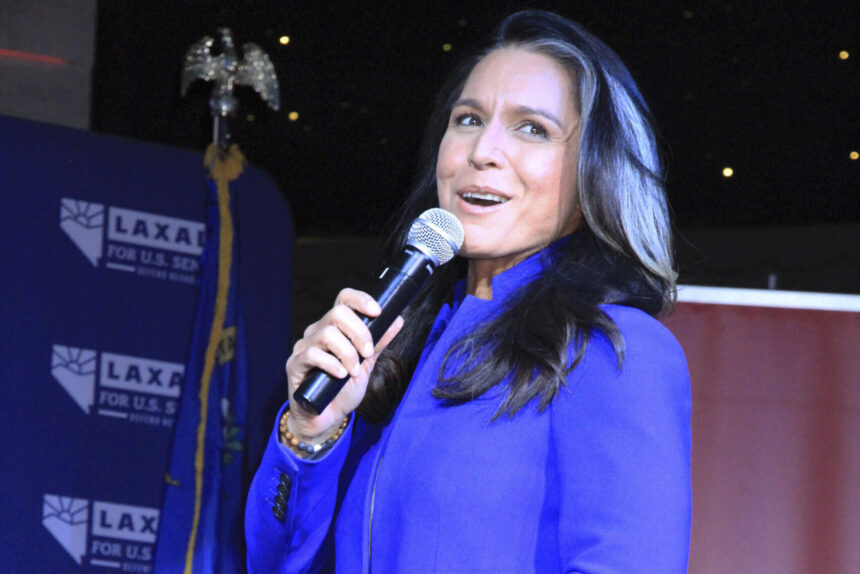Early in October, Tulsi Gabbard, failed Democratic presidential candidate and ex-congresswoman from the Aloha state, posted on Twitter a scathing video announcing her departure from the Democratic Party—the party with which she had been affiliated as a public servant for some 20 years. No one who has followed her political career closely will regard this move as surprising; indeed, it was long overdue. What may have been surprising to some, however, was the sheer vehemence of her farewell. In short, she left no bridges unburnt.
Yet the metaphor is faulty. Armies in retreat burn bridges, and Tulsi doesn’t sound like a woman in retreat. On the contrary, her farewell sounds like a declaration of war against the party that viciously turned on her in 2020. Most of her remarks would pass muster at a Trump rally. They are rhetorically effective but have the feel of something too carefully scripted and over-rehearsed. There is vehemence in the phrasing but a certain uncanny disconnect between the emotional force of the words and her distanced manner, as though she had spent half an hour on her yoga mat prior to recording the video. Still, she is making the right noises.
Many on the Republican side are rushing to applaud her; others are more reserved, and a few are warning that she is just another opportunist. Ahead of the November midterms, she cast herself as an independent but is conspicuously campaigning for MAGA Republicans like Arizona gubernatorial candidate Kari Lake. It seems apparent that Tulsi has her eye set firmly on the main chance: the 2024 presidential ticket. Whether she will be a reliable torchbearer for the right is open to debate.
She denounces the Democrats for their “cowardly wokeness,” for their “racializing [of] every issue,” and for their demonizing of the police while weaponizing the “national security state to go after political opponents.”

Oct. 11 farewell to
the Democratic Party
(Tulsi Gabbard / via Twitter)
Less palatable to some Republican insiders might be Tulsi’s opening volley: “I can no longer remain in today’s Democratic Party that is now under the complete control of an elitist cabal of warmongers…” Over much of her political career, she has aimed this sort of criticism at both parties for their waging of perpetual wars, in the Middle East and elsewhere, aiming to foment regime change in the sacred name of democracy. And we can be sure that, despite the declining fortunes of the neoconservatives, many Republican political operatives in the foreign-policy establishment recognize that “Team Tulsi” will not be playing on their side.
“I can no longer remain in today’s Democratic Party that’s under the complete control of an elitist cabal of warmongers, who are driven by cowardly wokeness, who divide us by racializing every issue and stoking antiwhite racism, who actively work to undermine our God-given freedoms that are enshrined in our Constitution, who are hostile to people of faith and spirituality, who demonize the police but protect criminals at the expense of law-abiding Americans, who believe in open borders, who weaponize the national security state to go after their political opponents, and above all who are dragging us ever closer to nuclear war.”
–Tulsi Gabbard
Taking a page from the Hillary Clinton playbook, some powerful Republicans have accused Gabbard of treason. In March of this year, she claimed in a Twitter video that the U.S. funds as many as 30 biolabs in Ukraine that are “conducting research on dangerous pathogens.” According to The Hill, Rep. Adam Kinzinger (R-Ill.) called her “traitorous,” suggesting that she should “go to Russia.” Similarly, Sen. Mitt Romney tweeted that Gabbard was “parroting false Russian propaganda.” He added, “Her treasonous lies may well cost lives,” without specifying whose lives were endangered. Virtually the whole of the corporate media “fact-checked” Tulsi’s claims, all of them “parroting” the same line: Yes, the U.S. has funded biolabs in Ukraine since 2005—but to prevent, not to produce, biological weapons.
In fact, the fact-checkers had already been checkmated just a few days prior to Kinzinger’s and Romney’s reckless denouncements, when über neocon Victoria Nuland stumbled into an embarrassing admission under the questioning of Sen. Marco Rubio during a Senate Foreign Relations Committee hearing. On March 8, she stated, “Ukraine has biological research facilities which, in fact, we are now quite concerned [that] … Russian forces may be seeking to gain control of.” She further conceded that the U.S. was “working with the Ukrainians on how they can prevent any of those research materials from falling into the hands of Russian forces.”
One might well ask why Americans should be particularly alarmed that the Russians might gain control of the aforementioned labs if, in fact, they contain no dangerous biological materials. That Gabbard should be pilloried with accusations of treason for claiming that the U.S. is funding Ukrainian development of bioweapons tells us everything we need to know about her accusers: They were and are engaged in a cover-up of something. Leftist journalist Glenn Greenwald, writing in MRonline, was perfectly right to ask:
What is in those Ukrainian biological labs that make them so worrisome and dangerous? And has Ukraine, not exactly known for being a great power with advanced biological research, had the assistance of any other countries in developing those dangerous substances?
Tulsi has the courage of her convictions, especially with respect to foreign policy, and that has won her plaudits on the right, not to mention a number of appearances on Tucker Carlson Tonight. But her hejira out of the Democratic Party is freighted with worrisome baggage, including her long attachment to her guru, Chris Butler; her support for the socialist mountebank Bernie Sanders; and her enthusiasm for gay marriage rights.
Tulsi identifies as Hindu, and her attachment to that religion was formed during her teen years, when her parents became devotees of Chris Butler, who founded in 1977 the Science of Identity Foundation, an offshoot of the Hare Krishna movement, which had been formed in 1966 and drew heavily on the long tradition of Gaudiya Vaishnava, a Hindu sect focused on the worship of Vishnu and dating back to 16th century India.
According to a long profile written by Kelefa Sanneh in The New Yorker, Butler, originally a surfer and yoga instructor in Hawaii, broke with the Hare Krishnas after a few years to form his own group, which by the early 1980s apparently numbered in the thousands. According to those who knew the Gabbard family in those years, their home was full of images of Butler, and his influence on their lives seems to have been enormous. In fact, young Tulsi was sent to the Philippines for two years to be educated in schools run by Butler’s foundation.
According to Sanneh, a number of former disciples of Butler tell stories
of followers forbidden to speak publicly about the group; of returning travelers quarantined for days, lest they transmit a contagious disease to Butler; of devotees lying prostrate whenever he entered the room, or adding bits of his nail clippings to their food, or eating spoonfuls of sand that he had walked upon.
Tulsi herself states that she has no recollection of such cultlike behavior, but it should be noted that as recently as 2005, she referred to Butler as her Guru Dev (“divine teacher”).
None of this is to suggest that Butler is some kind of sinister puppet master manipulating Tulsi’s politics from behind the scenes. Much of the criticism of Butler is, at best, hearsay, and Tulsi’s Hinduism appears to have matured a good deal over the years. Nevertheless, it is not difficult to see how her religious background might render her vulnerable to attack in a future political campaign as a Republican—despite former South Carolina Congressman Trey Gowdy’s comment several years ago that she was “the most Christlike member of Congress.” Recall that the former governor of South Carolina, Nikki Haley, a Sikh by birth, converted to Christianity in 1997—an event that alleviated the impression of strangeness that might otherwise have damaged her electability in a state full of evangelicals and fundamentalists.
Equally concerning for Republican stalwarts would be Tulsi’s support for Bernie Sanders. As is well known, in 2016, then-Rep. Gabbard resigned from her post on the Democratic National Committee to support Sanders’s candidacy for the Democratic nomination. It might be argued that Tulsi shifted her support to Sanders largely to counter Hillary Clinton’s growing influence. After all, she and Clinton had been at odds for some time because of the latter’s support for the Iraq War (which Sanders had opposed) and her responsibility as secretary of state for the Libyan debacle in 2011.
Yet Tulsi’s rapport with Sanders ran deeper than agreement on foreign policy. She was an early supporter of “college for all” legislation, introduced by Sanders as the College for All act during the 117th Congress. Additionally, Tulsi showed support for his Medicare for All bill, put forward in 2019. Such proposals are not the sort of thing that plays well with heartland Republicans, as they watch millions of future Medicare recipients surge illegally across our southern border.
Finally, Tulsi’s position on same-sex marriage may trouble many in the Republican rank and file. As it happens, early in her political career, when she was still a state representative in Hawaii, she was outspokenly opposed to the gay agenda (reflecting the influence of her father, Mike Gabbard, himself a longtime Hawaiian politico). But in the 2011 campaign for the U.S. House, she began to change her stripes and came out in support of gay rights, including gay marriage. This change, as she has explained on a number of occasions, seems to have come about as a result of her service in Iraq. There, she says, her up-and-close acquaintance with repressive regimes convinced her that governments should refrain from interfering in the personal decisions of their citizens.
In this respect, she falls into line with the majority of millennials, who tend to be progressive or libertarian on social issues. Indeed, Washington Examiner Politics Editor James Antle III may be right when he suggests that Tulsi belongs to a growing number of younger Americans “who have become unmoored from the two-party system” and whose views tend to cross that divide.
If that is the case, then as older social conservatives begin to die off and these younger, “unmoored” Americans gain greater leverage at the polling booth, Republican voting patterns may be significantly altered. Large numbers of young Republicans already accept gay marriage as a fait accompli and, in fact, seem to have little awareness of the way in which our uncoupling of marriage from the male/female nexus has profound implications for that institution which is the beating heart of any viable society—the traditional family.
Tulsi, who has been married twice but remains childless, can certainly be praised for drawing a firm moral line in the sand on the matter of transgender rights. Nearing the end of her years in the House, in December 2020, she introduced the Protect Women’s Sports Act, a bill that, had it not been buried by the House Committee on Education and Labor, would have stipulated that Title IX protections for women’s sports programs must be based on biological sex. In short, women’s sports programs that included transgender athletes would lose federal funding. It may be that, with the new Republican majority in the House of Representatives, such legislation may be resurrected. If so, “Team Tulsi” will have something to crow about.
But whether a Donald Trump or a Ron DeSantis will risk naming Tulsi as a vice presidential nominee in 2024 is an altogether different matter.

Leave a Reply